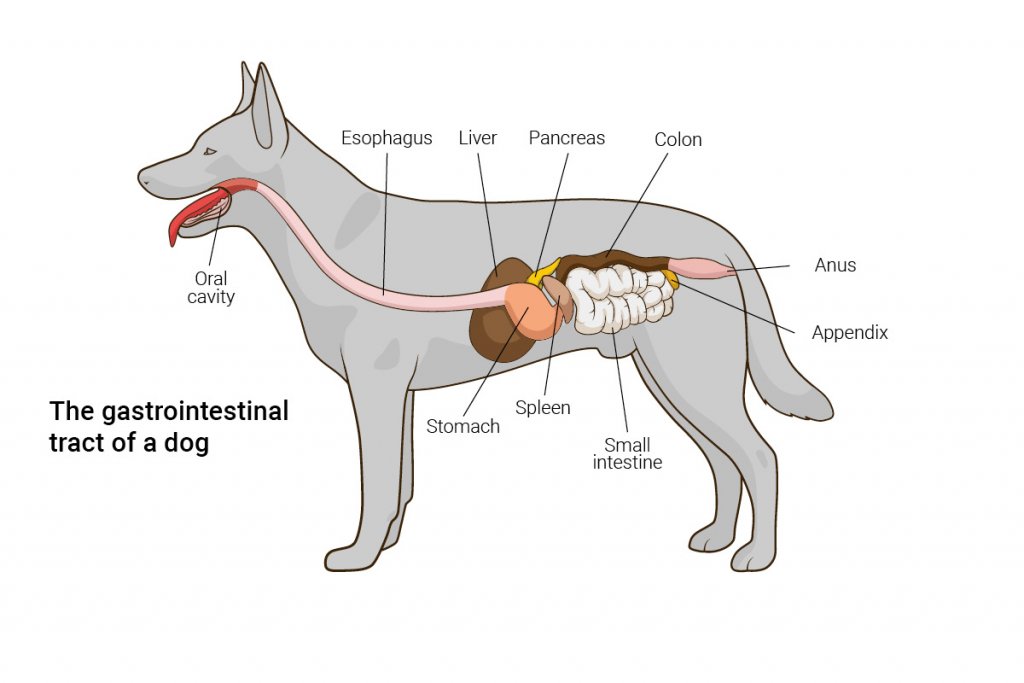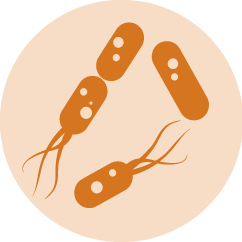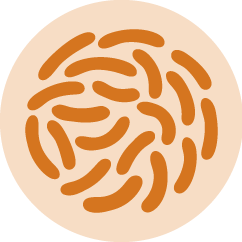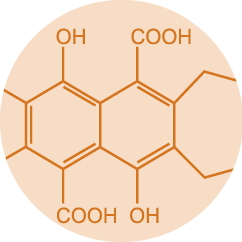Calibra VD Dog Gastrointestinal & Pancreas 12kg
- Veterinary Diets
- Consult with your vet
Reduction of intestinal absorptive disorders
9 July, 2021
The dog's digestive problems are one of the most common reasons for visiting a
veterinarian, who often recommends starting a veterinary diet. Are you
interested in how a change in diet can help and how is the Calibra diet
different from conventional food? Let's take a look at the complex issues of
digestion together.
 Digestive disorders are one of the most common problems for dogs – and therefore
Digestive disorders are one of the most common problems for dogs – and therefore
a reason to visit the veterinarian, whether it’s an acute problem (lasting a few hours or
days) or a chronic condition (lasting for weeks).
Based on the symptoms that your dog presents, the location of the problem can often be
determined:
 Diarrhea and/or vomiting leads to the reduced intake and absorption of basic nutrients, resulting in metabolic decline.
Diarrhea and/or vomiting leads to the reduced intake and absorption of basic nutrients, resulting in metabolic decline.
With illnesses affecting the digestive system, it is therefore
very important to get a diagnosis quickly and to begin therapy, and to choose an appropriate
and balanced diet.
In many cases, a proper diet can have a significant effect on the success of the therapy.
Dogs are carnivores, which means that their body requires a high portion of nutrients of animal origin and high-quality animal proteins.
Processing of food begins in the oral cavity, where preparation fordigestion takes place.
Food then moves through the esophagus towards the stomach, where the digestion of proteins begins. This process is enabled by the anatomy of the stomach and the presence of stomach acids, which activate enzymes that digest proteins further in the small intestine.
The digested food then moves from the stomach to the small intestine. The small intestine is the central organ for breaking down macronutrients (fats, proteins, sugars) into simple components capable of absorption by intestinal cells called enterocytes. They are then transported across the body and used in the cells as a source of energy or as building materials (such as muscles).
The pancreas produces enzymes necessary for breaking down macronutrients. Enzymes are released into the small intestine. With the help of activated enzymes, the small intestine can digest and absorb proteins as well as fats and sugars.
The large intestine is where the final absorption of water and minerals takes place; the content is concentrated and formed into stools.

If the processes described above are disrupted in any way, it can
affect the function of the entire organism. Key causes of issues include:
 Infection (caused by bacteria/viruses)
Infection (caused by bacteria/viruses)
 Excessive salivation/drooling
Excessive salivation/drooling
A properly chosen food has a positive effect on the progress of illnesses and convalescence.
 Any issue of the digestive tract leads to changes in the intestinal microflora and the disruption of the digestive tract’s physiological function:
Any issue of the digestive tract leads to changes in the intestinal microflora and the disruption of the digestive tract’s physiological function:
In general, it is recommended to use a food that primarily provides high nutritional and
energetic value in small portions, i.e. highly palatable and highly digestible balanced food.
Recommend to you
Calibra VD Dog Gastrointestinal & Pancreas 12kg
Reduction of intestinal absorptive disorders
sensitive digestive tracts. It contains:
Provides the proper amounts of beneficial additives:
Recommend to you
Intended use:
Reduction of Intestinal Absorptive Disorders
Compensation for Maldigestion
Exocrine Pancreatic Insufficiency
Rapid a high digestibility supports the digestive processes and allows nutrients to be absorbed as fast as possible. A lower quantity of fat reduces pancreatic irritation. Prebiotics, including fructooligosaccharides, mannanoligosaccharides, yeasts, and special yeast cultures, support the growth of beneficial intestinal bacteria - the intestinal microbiome (colonization of the intestinal surface). If the microbiome works well, the growth of pathogens is suppressed.
Lactobacillus acidophilus (inactivated), which acts as probiotics, together with beta-glucans significantly improve the immune processes in the intestines. Extracts of turmeric decaffeinated green tea, and Yucca schidigera all play a role, as well as unique fulvic acids, which contribute to stabilizing the digestive tract.
What is a microbiome, and why is it important?
 A microbiome comprises the microorganisms that live on the surface of the body or the mucus membranes (bacteria, viruses, fungi) and consists of far more cells than the total number of cells in the host organism is. Disruption of the microbiome can affect the overall function of the organism. Microbiome supports the host’s metabolism by microbial digestion of non-digestible components of food such as complex polysaccharides (known as fiber) and transforms these components into important metabolites with concrete function, e.g. energy-rich short-chain fatty acids that act as the source of energy for enterocytes. This process also pushes pH in the intestinal environment down, what naturally reduces the amount of pathogens. “Good” bacteria produce proteins and peptides with antimicrobial properties and compete for available nutrients with pathogenic bacteria, thereby significantly protecting the host.
A microbiome comprises the microorganisms that live on the surface of the body or the mucus membranes (bacteria, viruses, fungi) and consists of far more cells than the total number of cells in the host organism is. Disruption of the microbiome can affect the overall function of the organism. Microbiome supports the host’s metabolism by microbial digestion of non-digestible components of food such as complex polysaccharides (known as fiber) and transforms these components into important metabolites with concrete function, e.g. energy-rich short-chain fatty acids that act as the source of energy for enterocytes. This process also pushes pH in the intestinal environment down, what naturally reduces the amount of pathogens. “Good” bacteria produce proteins and peptides with antimicrobial properties and compete for available nutrients with pathogenic bacteria, thereby significantly protecting the host.
What is Lactobacillus acidophilus – inactivated
 Lactobacillus acidophilus is a probiotic - alive bacteria - that is commonly found in natural intestinal microflora. Calibra uses inactivated bacterial cultures in Gastrointestinal & Pancreas VD with so-called paraprobiotic effects. It means that inactivated culture contains the same components as alive bacteria and the immune system acts in the same way showing off similar effects as by viable bacterial cultures.
Lactobacillus acidophilus is a probiotic - alive bacteria - that is commonly found in natural intestinal microflora. Calibra uses inactivated bacterial cultures in Gastrointestinal & Pancreas VD with so-called paraprobiotic effects. It means that inactivated culture contains the same components as alive bacteria and the immune system acts in the same way showing off similar effects as by viable bacterial cultures.
The advantage of this inactive form is that it is not necessary to protect its viability, whether during the food production process or in the aggressive environment of the stomach.
What are fulvic acids?

Fulvic acids are referred to as a group of organic acids that originate in the
organic components of soils (humus). By adding them to the food we add the component that has always been a part of the natural nutrition of animals. Their primary function is to bind and remove toxins and heavy metals from the intestinal environment. They are also known for their positive effect on the absorption of nutrients and their anti-inflammatory properties.

 The most reliable and clearest indication of the effectiveness of therapy/food is byexamining the stool quality. A fecal score system is used.
The most reliable and clearest indication of the effectiveness of therapy/food is byexamining the stool quality. A fecal score system is used.
If digestion is working properly, stools have an optimal consistency without foreign bodies. If diarrhea/constipation is observed, it is clear we face a problem that needs to be diagnosed. Chronic (long-lasting) diarrhea can be dangerous, as the organism loses not only water but also important nutrients. Food moves through the intestines so quickly that the necessary nutrients are unable to permeate cells, and the body therefore cannot utilize them. The body must then take nutrients from its own tissues and internal sources, and the animal begins to lose condition, activity, and weight. As a result, the reduced energy levels can lead to apathy.
One of the first indicators that a diet is working is the improvement of stool consistency.
 The Calibra Gastrointestinal diet has been specially developed by veterinarians based on the latest scientific information. Its high digestibility and balanced nutrients prevent the overload of the digestive tract and stimulate the normal physiological function of the intestines. This means that even small amounts (compared with normal meal sizes) can provide the daily required nutrients. During treatment, the recommended daily amount should be divided into multiple smaller portions given throughout the day to avoid the overload of the GI tract. Today, veterinary diets stand somewhere between medicine and food, and they help support treatment strategy in the most natural way.
The Calibra Gastrointestinal diet has been specially developed by veterinarians based on the latest scientific information. Its high digestibility and balanced nutrients prevent the overload of the digestive tract and stimulate the normal physiological function of the intestines. This means that even small amounts (compared with normal meal sizes) can provide the daily required nutrients. During treatment, the recommended daily amount should be divided into multiple smaller portions given throughout the day to avoid the overload of the GI tract. Today, veterinary diets stand somewhere between medicine and food, and they help support treatment strategy in the most natural way.
Calibra Gastrointestinal & Pancreas VD fulfills this role. Furthermore - you can feed it to
your dog on a long-term basis or even for his entire life.
Choose your preferred language